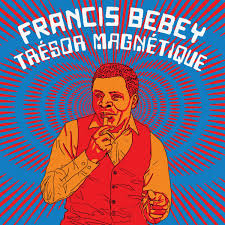Francis Bebey - Trésor Magnétique (Vinyl)
Francis Bebey - Trésor Magnétique (Vinyl)
Couldn't load pickup availability
Tresor Magnetique, this compilation of unreleased tracks, archival recordings, and neglected gems from Bebey's vault, feels like a grand reveal in an ongoing narrative-a story that spans continents and generations. The compilation's name (translated as "Magnetic Treasure") sets the stage perfectly. Not only does it reference the fragile tapes discovered in the home of Bebey's son, Patrick, but it also hints at the almost gravitational pull of Bebey's art. Meticulously digitized at Abbey Road Studios, these tracks radiate clarity and urgency that defy the decades separating them from contemporary ears. One listen to Tresor Magnetique, and it's as if you're opening a letter from another era, only to find that its contents speak to you more vividly than today's headlines.
What makes Bebey's work stand out, even among the pantheon of African giants like Fela Kuti or Miriam Makeba, is his insistence on creative independence. While some African artists of his time pursued long-term contracts with global labels-looking for distribution, prestige, or simply the means to reach wider audiences-Bebey stuck to his own imprint, Ozileka. He did so at the cost of mainstream visibility, certain financial benefits, and even the risk of occasional obscurity.
Looking back, we see the wisdom in that choice: he preserved his freedom to experiment without external gatekeepers telling him what to play or how to sound. It's a rare feat in any age, let alone in an industry that frequently sought to pigeonhole African music into safe, predictable compartments. One might be tempted to frame Bebey as prophetic-the man who foresaw a future of global African beats pumping through speakers in Berlin, New York, or Tokyo. Yet casting him as a prophet risks oversimplifying his creative complexity. Bebey was less about gazing into a crystal ball and more about kindling possibilities. He deeply believed that African music could shape global culture, and he devoted his life to proving it-in his recordings, his writing, and his tireless advocacy for artists who might otherwise have been overlooked. His music demands active, inquisitive listening; it wasn't crafted to please passersby but to engage those ready to embrace its layers.
The scope of Bebey's artistry extends beyond the music alone. His lyrics brim with social commentary, delivered with a nimble combination of humor and earnestness. "La Condition Masculine" (English Extended Version) pokes at patriarchal norms, dancing right in that sweet spot between levity and razor-sharp critique. "Dash, Baksheesh & Matabish" skewers corruption with an equally playful vibe-casting bribes and clandestine deals as a universal oddity rather than a localized sin. The net effect is that you can't help but sway to the beat, even as you recognize the incisive jab at universal failings. On the more intimate side, "Immigration Amoureuse" paints a picture of a love constrained by borders and bureaucracies. For many Africans who journeyed or migrated to Europe, Bebey's depiction rings painfully true. Another track, "Where Are You? I Love You," tugs directly at the heart, a raw confession of longing that transcends linguistic and cultural frontiers. In these songs, Bebey's gift for uniting the personal and the political becomes crystal clear, urging listeners to understand that romantic struggle often has real-world, systemic underpinnings.
Yet if you dive deeply into his repertoire, what stands out most is his restless drive to experiment.
In an era when African artists were sometimes stuffed into marketing categories like "world music" or "folk," Bebey adamantly mixed and matched instrumentation that had seemingly no business coexisting. A pygmy flute might flutter against the metronomic pulse of a drum machine, or a classic guitar riff might coil around a looped synthetic soundscape. "Forest Nativity (Extended Version)" exemplifies this collision of tradition and modernity, weaving thumb-piano motifs with ghostly electronics. In hearing these recordings, you get the sense of a mind in constant motion, rarely content to finalize a piece and move on.
Alternate versions like "Je Vous Aime Zaime Zaime (Alternate Drum Machine Version)" reveal subtle, sometimes seismic, transformations that occur when a live rhythm section is replaced with mechanical pulses. "Agatha (Alternate Version)" and "Savannah Georgia (Alternative Version)" likewise demonstrate his compositional curiosity-tweaking a chord progression, adjusting a drumline, or layering a different vocal take. The net result is an insider's glimpse at how Bebey's creative process was shaped by never-ending experimentation rather than singular flashes of inspiration.
What Bebey was doing was not about prediction-it was about possibility. He believed that African music had the power to shape the world, and he spent his life proving it, whether through his own recordings, his writing, or his tireless promotion of artists and ideas that others might have ignored. His music was not made for the masses; it was made for those who were willing to listen closely, to engage with it on its own terms. This compilation takes us deeper into that world.
Share


